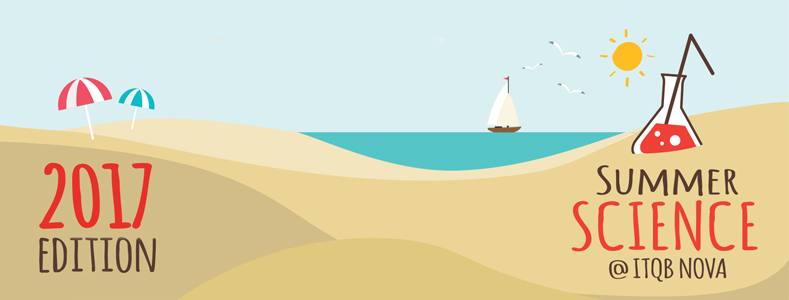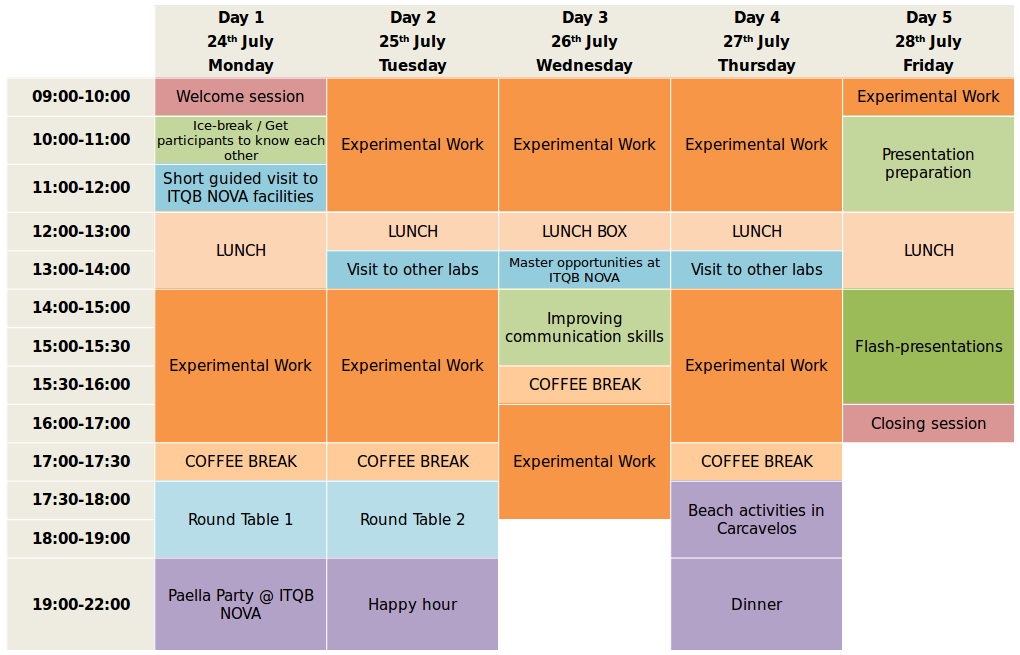2017

2017 Summer Science @ ITQB NOVA organizing committee
Ana Petronilho | Carina Valente | Carla Jorge | Cirenia Arias | Gonçalo Graça | Joana Lobo Antunes | José Artur Brito | Luís Lima | Pedro Barros
2017 Programme

ROUND TABLE I: Life in the Lab (the real deal) 24th July, 17h30-19h00
The round table will have the participation of principal investigators, post-docs, PhD and Master students. Each participant will share their scientific paths, how they reach to their positions, what are their major concerns and the successes achieved. The daily life in the lab from different perspectives will be discussed.
PIs: Prof. Carlos Romão and Prof. Cristina Silva Pereira
Post-docs: Sofia Venceslau and Tiago Lourenço
PhD students: José Rodrigues and Ana Licuco Massouh
Master students: Vanessa Almeida and Patricia Sequeira
Moderator: José Artur Brito
ROUND TABLE II: Science Out of the Box 25th July, 17h30-19h00
Science serves society in many forms and its role in a variety of fields is often overlooked. As a reflect of this, trained scientists embark in a variety of different careers, some of them directly linked to science, some of them not, in all cases with a direct translation of the lessons learned in the lab. Thus, this round table focuses on the experiences of scientists working in a variety of scientific and non-scientific fields, making with their everyday tasks, science spreading out of the box.
With
António Candeias, HERCULES Laboratory (HERança CULtural, Estudos e Salvaguarda / Cultural Heritage Studies and Safeguard), Universidade de Évora
Leonel Alegre, Science Communication
Sofia Rodrigues, Maratona da Saúde
Rita Caré, Urban sketching applied to science communication
Moderator: Margarida Trindade
2017 Participating Laboratories
For 2017 Summer Science @ ITQB NOVA there was a total of 30 positions at the following laboratories:
- Molecular Microbiology of Human Pathogens
The Molecular Microbiology of Human Pathogens group is studying how human interventions, such as the use of vaccines and antibiotics, impact on the nasopharyngeal ecosystem, a rich niche frequently inhabited by potentially pathogenic bacteria such asStreptococcus pneumoniae.
Responsible investigator: Raquel Sá Leão
The Protein Modelling Laboratory works on molecular modelling of proteins using physical methods. The areas of work range from basic research in modelling methodologies to applications with biotechnological and biomedical interest.
Responsible investigator: Cláudio Soares
- Inorganic Biochemistry and NMR
The Inorganic Biochemistry and NMR Laboratory is devoted to the structural and functional characterization of redox proteins that participate in the anaerobic bioenergetic metabolism of microorganisms, using biophysical methods.
Responsible investigator: Ricardo Louro
The genomics and stress laboratory works in the mechanisms involved in homeostasis control when yeast cells are exposed to different environmental cues. The function of Yap transcription factors in stress response is investigated.
Responsible investigator: Catarina Pimentel
- Proteomics of Non-Model Organisms
The information obtained with the powerful Mass Spectrometry techniques is fundamental for the structural characterization of chemical and biochemical species.
Responsible investigator: Ana Coelho
The Bacterial Energy Metabolism group investigates the metabolic pathways for energy production in anaerobic microorganisms that are relevant to health and the environment, and explores their biotechnological applications.
Responsible investigator: Inês Pereira
- Microbial & Enzyme Technology
The research activities are in the field of Molecular Biotechnology aiming at the eco-efficient use of natural resources, the set-up of new bioremediation processes, and the production of bio-based products.
Responsible investigator: Lígia Martins
Control of Gene Expression group studies focus on the control of gene expression. It has studied RNA degradation and characterized enzymes that mediate decay. Other interests are stress and microbial growth. This work has many applications in Biotechnology and Health.
Responsible investigators: José Andrade | Sandra Viegas
- Bacterial Evolution and Molecular Epidemiology
The Laboratory of Bacterial Evolution and Molecular Epidemiology aims to understand the molecular basis of bacterial evolution with focus on the pathogenicity and evolution of antimicrobial resistance determinants and antimicrobial resistant clones in opportunistic bacteria.
Responsible investigator: Maria Miragaia
Bioorganic Chemistry is the interface of organic chemistry and biology. Our research uses the principles and techniques of organic chemistry in attempting to solve problems of relevance to biology. We can design synthetic derivatives of natural products, that improve on nature.
Responsible investigator: Rita Ventura
- Biomolecular Self-Organization
We believe that life can be recreated using purified components and that by doing so we uncover fundamental principles. Our aim is to understand the organization and dynamics of macro-molecular complexes and how these give rise to cellular structure and function. Our main tools are single molecule fluorescence microscopy, reconstituted in vitro systems and quantitative cell imaging.
Responsible investigator: Alvaro Crevenna
The Multiscale Modeling Lab employs computational molecular simulation models at different resolution scales to tackle a wide range of biological questions.
Responsible investigator: Manuel N. Melo
- Membrane Protein Crystallography
In the Membrane Protein Crystallography Laboratory, we determine the three-dimensional structure of biological macromolecules. The laboratory is integrated in the Macromolecular Crystallography Unit.
Responsible investigator: Margarida Archer
At the Plant Metabolomics Laboratory we use Analytical Chemistry and Mass Spectrometry-based technologies to study the metabolic mechanisms underlying plant responses to adverse environmental conditions.
Responsible investigator: Carla António
This multidisciplinary research team is committed to develop new biomolecular tools, such as nanoparticles (CdSe@ZnS quantum dots) and biosensors, for practical applications like disease diagnostic and bioprocess monitoring..
Responsible investigator: Abel Oliva
Bacterial spores are encased in a protein shield (or coat) that confers resistance against noxious chemicals and predation, protects the underlying cortex peptidoglycan layer from the action of lytic enzymes, and is a key sensor of the environment. The spore surface proteins are synthesized in the mother cell, one of the two compartments of the sporulating cell.
Responsible investigators: Adriano Henriques | Mónica Serrano
In the Bacterial Cell Biology laboratory we use the Gram positive pathogen Staphylococcus aureus to study the mechanisms of cell division and of antibiotic resistance to cell wall targeting antibiotics.
Responsible investigator: Mariana Pinho
Research in our group is centred in the synthesis and applications of biologically relevant N-heterocyclic carbenes.
Responsible investigator: Ana Petronilho
At GPlantS lab we study the effect of environmental factors on the regulation of gene expression and plant development, with special focus on salt, drought and temperature stresses, using a number of different genomics approaches.
Responsible investigator: Margarida Oliveira



